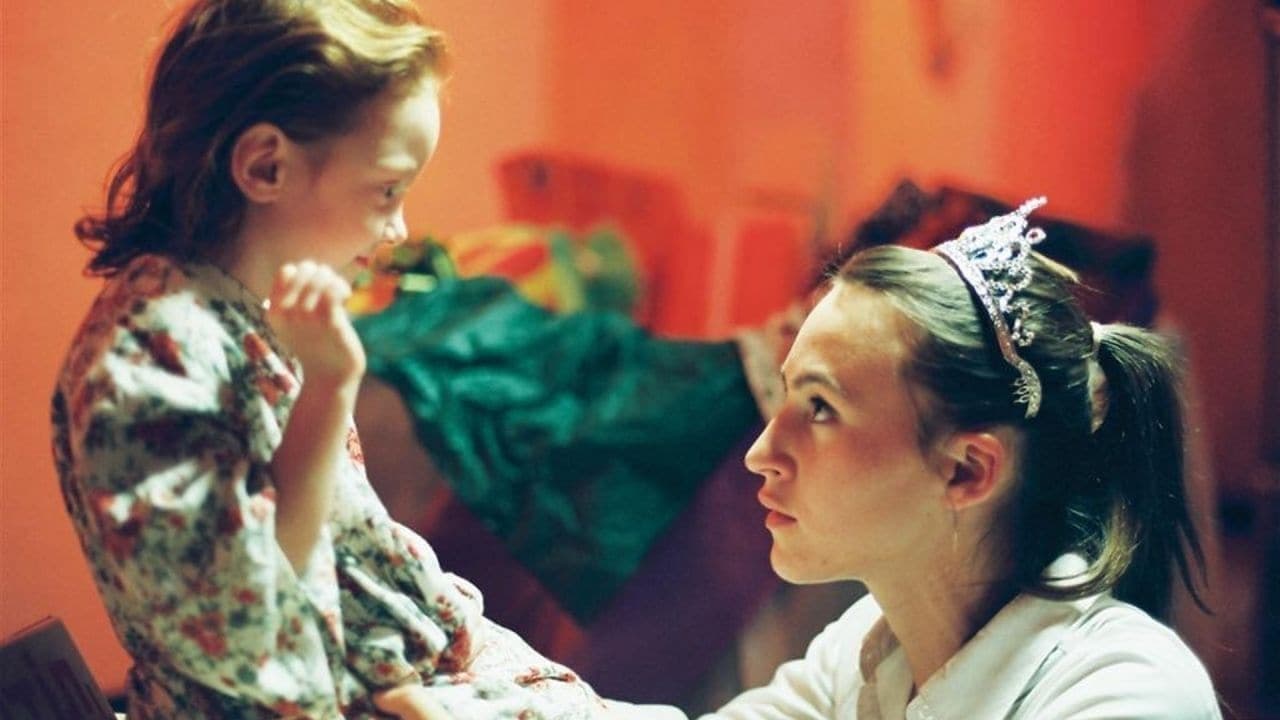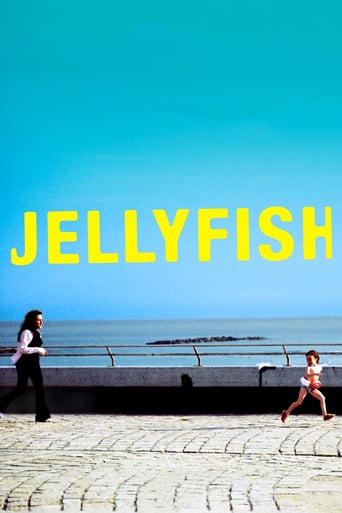

Jellyfish, for all its generous spirit and life-affirming moments, doesn't shy away from the little absurdities that inundates everyday existence. Even in the same frame there is a glow amid the isolation and personal embitterment. An unbearable lightness that cannot help but expose the chalky hands of fate. Those who have ever asked in exhaustion, "why me?" can find a lot to love about this little Israeli import.The film is told through a hyperlink narrative. Though its themes are much more ethereal than those of Traffic (2000) or New Year's Eve (2011). That and the narratives don't so much interlock as they migrate towards and away from each other. We follow the progression of three struggling women adrift in noisy Tel Aviv, vexing over life's ennui. While doing so, the women cross paths, barely glimpsing each other's existential angst.The first women is the young Batya (Adler). She's a sullen, ineffectual banquet hall waitress, struggling to keep her job and an apartment that's slowly falling apart. Meanwhile her divorced, working professional parents all but ignore the warning signs of her mounting depression, brought about when her boyfriend leaves her. Unexpectedly, while trying to relax at the beach, a mute child (Leidman), freckled and wet, appears like a vision. She tries to find out to whom the child belongs to, to no avail.The second woman of our story is newlywed Keren (Knoller) whose Caribbean honeymoon has been botched by a faulty bathroom stall. Her ankle now broken, she tries to make the best of a worsening situation, by following her husband Michael (Sandler) to an aging sea side hotel in town. It is there that Michael meets an attractive writer (Albeck) whose femme fatale allure threatens the strength of their new marriage.The third woman is a Filipino caretaker named Joy (De LaTorre). Joy tries and repeatedly fails to connect with her employer (Harifai) whose tersely shouts in Hebrew and German, neither of which Joy speaks. She pines to have her son with her, vainly communicating with him through short collect calls and promises of gifts and visits.A common motif that permeates all three stories is that of water. Joy is mesmerized by a toy boat she wants to get her son, while Keren complains that they're a short walk from the beach yet can't see the sea. She also begins to write a poem, wistfully equating her feelings of isolation to that of a ship in a glass. Finally there's Batya whose discovery of the child on the beach, unlocks dormant traumas that include her parents arguing as the young Batya drifts out to sea in an inflatable tube. Could the water represent transition and the possibility of renewal? Perhaps yes, perhaps not.The magical realism that seeps into the lacquered grooves of this film brings with it occasionally irksome subjectivity that's nearly impossible to decode. This film doesn't hold your hand but rather lets you explore the serendipity of Jellyfish's world through the eyes of three women who are dulled by constant misfortune. Some may find their woes pedestrian and cloying, especially considering the film is Israeli and completely ignores political realities. Yet choosing characters that exhibit the incessant, hard to describe hum of anxiety and depression gives the film both a timelessness and a universality. In the end, there's solace in the arms of others; a lesson that those quietly suffering would be wise to heed.While occasionally stodgy, Jellyfish doesn't wear out its welcome, finding just enough pulp in the stories while reveling in some art- house expressions and compositions. The subjectivity of its framework works in its favor to deliver a film that can be read in many ways, including being a frank and effective meditation on depression. It does all this without being showy or overly pretentious but instead lingering on the deflation of character expectations, before rewarding its audience with small but meaningful victories.
... View MoreThis is my interpretation to the lower layer of the movie: Batia, whose parents abandoned her when she was a child, abandoned herself too within all the stress and loneliness of life in the big city. The sea shore is the place in which Batia is reconnecting with herself. The small child coming out of the sea symbolizes "Batia the child". Batia goes out for a journey of self search after this small child (herself). At the end, she finds herself, leave the small child at the bottom of the sea and reborn from the water to a new life.Other characters in the movie have their own parallel plot lines of trying to survive in the loneliness and alienation of the big city. They seek love but the people around them rarely notice their existence. The different characters briefly cross each other in different points during the movie, but the alienation breaks only at the end of the movie.After I saw the movie, I felt there is a lesson to it – not to abandon ourselves just because others abandoned us, reach to other people around us.
... View MoreI just saw this movie on Sundance Channel. Maybe my opinion is unique, but I think this movie is about how we all experience and deal with abandonment in life. Batia, abandoned by her parents from childhood, has in effect even abandoned herself. She sees herself in the mystery child, alone and unable to communicate. When the child disappears, did the child abandon her or did she abandon the child by yelling? As she grapples with the dilemma, she faces her own childhood disappointment which she describes to a friend in the memory of an ice cream man on the beach. In the poignant scene Batia says, "They promised he'd come back." The friend reassures, "Don't worry, he's always around." I think in the end, her friend and the child help Batia to heal and finally feel secure about drifting through the great sea of life.In the second story, will the bride and groom abandon one another when marriage, like their tiny hotel room, is uncomfortable and feels confining, or will they learn to expand in their appreciation for one another and grow even closer? I disagree with the GOOFS section because of what must have been said in the unseen part of the story where Keren explains on why they must go downstairs. I think he knew full well when the handwriting changed because at that point he handed over the paper as he acknowledges there is more to his new wife than he realized. Together they gaze at the sea contemplating.Lastly, Joy watches as parents are abandoned by children and children abandon their parents. All she can think of is crossing the ocean to get back to her little boy.I loved this movie! Maybe I healed a little bit in watching it.
... View MoreThis is a loosely woven story about different people who all live in the same city, and occasionally cross paths, but do not know each other. The stories of the individual characters at first seem ordinary, but there are hidden insights into their lives that are touching. An elfin from the ocean adds an unresolved aspect. Does it matter that the protagonist barely has a roof over her head, while her publicity-seeking mother champions the cause of the homeless? Does it matter that parents and offspring misunderstand each other, or worse, are apathetic? Does it matter that the elfin with the float ring mysteriously appears and disappears. Life itself is this way, rarely neat and tidy.To those who like a film to be obvious with its message and linear with its storyline, this film will disappoint. To others who are willing to just watch and float along, this movie will have you enjoying it long after the closing credits have rolled. Definitely a film to talk about!
... View More